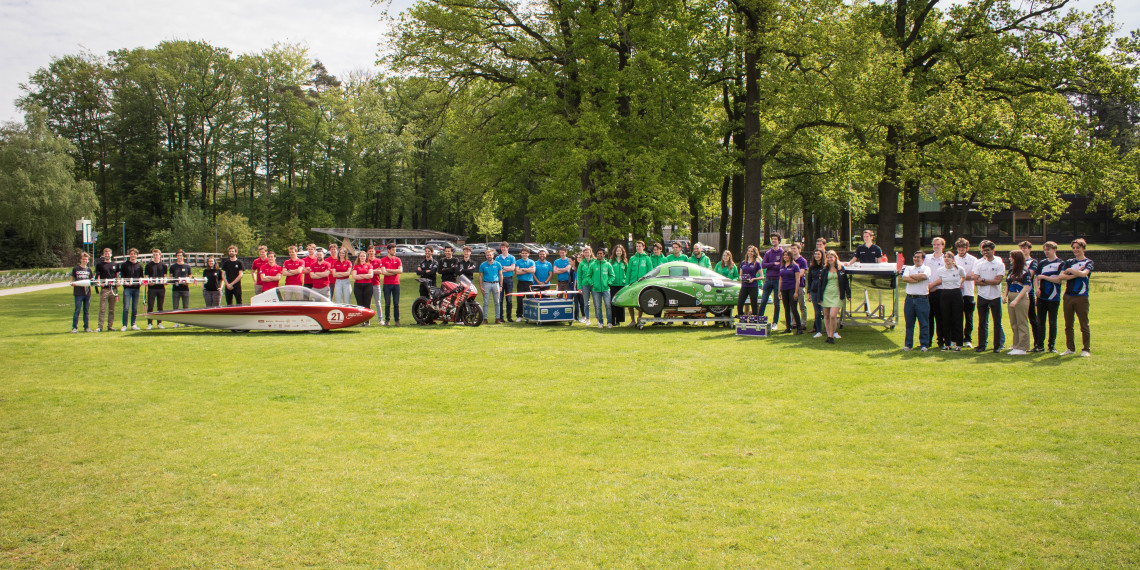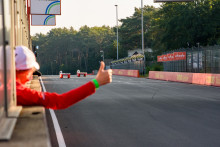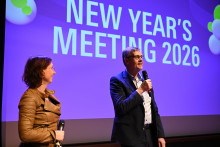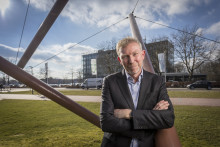It is March 2023 when members of Drone Team Twente take a final test at the airport above the campus before participating in the annual iMechE UAS Challenge in England. While the drone just won't stay in the air, a team member talks about their dot on the horizon: making a difference with the drone in developing countries, by delivering medicines and vaccines in areas that are almost impossible to reach. 'Our drone would be suitable for that in the long term.'
A noble goal, but more than a year and a half later, the seventh generation of the team has not yet succeeded in making their drone fly stably. Current team manager Pau Ribas acknowledges that ambition and reality do not always go hand in hand. 'That's why we said this year: let's let the drone fly first, then we'll see.'
Rock-solid competition
According to him, the fact that the team is struggling to make progress is because changing the guard often also means that the successors – despite a coherent handover – have to reinvent the wheel. Recognizable for Deef van der Linde, manager of Robo Team Twente. 'It's not ideal that we start from scratch every year. You can see that this is easier with competitors with a different construction.' He is referring, for example, to the German Mannheim TIGERs, where the presence of scientific staff keeps more knowledge on board. A team that, partly because of this, is miles ahead of the Twente team.
'We were mainly optimising our car, instead of innovating'
The two solar teams from Twente – Solar Team and Solar Boat – came up with a ruse to avoid having to start from scratch every summer. They launched a real innovation team, which even operates separately at the Solar Team. At the beginning of 2023, then-manager Kirsten Bouwman said that 'you are in the current cycle of a year and a half with tight deadlines, after which we hand over the work to the next team. We don't have time to think big.'
Maartje Peters recognizes the lack of room for innovation. Green Team Twente – which has been known as HyDriven since this year – therefore switched to another competition in 2021; the Formula Student. While competitors work with an electric drive, HyDriven does so on hydrogen. A drastic change of course, because previously the team always competed in the Shell Eco Marathon, which it won several times. 'We were mainly optimising our car, instead of innovating', says manager Peters. The disadvantage of the pioneering campaign is that HyDriven has been rare in its kind in recent years, which meant that there was no competition. The hope is that by the end of this season, there will be its own hydrogen class.
Podium places
The creation of the innovation team contributed to international success for the Solar Team, with won in Morocco (2021), took silver in Australia (2023) and South Africa (2024). 'The innovation team ensures that we can take more risks and think out-of-the-box. That certainly helps in our good performance', says current manager Laura Voogd.
(Text continues below the photo.)

Performance that comes with a lot of media attention. 'That makes the teams good calling cards for the UT. They also provide a lot of extra activities, for example to primary schools,' explains Joost Steppé, Director of Marketing & Communication and involved in the student teams committee. According to him, it is only logical that the performance of the teams differs. 'That also has to do with the number of years a team has been active. The Solar Team is world-class, but has been around for about twenty years. A lot of other squads are much younger.'
Basic sponsorship
Visibility, the multidisciplinary collaboration and the connection with the labour market means that the UT invests in the teams every year. Although a set of conditions does apply. A challenge is a requirement: it can be a competition, but it can also be a self-devised challenge. For eight of the nine teams, the UT has budgeted 15,000 euros in basic sponsorship for 2025. For Solar Team Twente, this amounts to almost 60,000 euros. The UT will also pay for the lease of the Future Factory – where most of the teams are housed – for two of the four quarters: that is 65,000 euros.
'At the finish in Australia, interesting employers such as Google and Tesla are waiting for the teams'
For one team – take the Drone Team – the UT's basic sponsorship is the biggest source of income. For Solar Boat Twente, the UT is not the main sponsor, but 'just a diamond partner'. 'We have a lot of sponsors. They support us not only financially, but also with materials, hours or spaces that we use', explains team manager Birgit van der Burg.
Training wheel operation
A dip in student activism, the return of the long-term fine: many associations or boards notice that it is more difficult to find students willing to do something besides their studies. For the time being, one team notices more of this than the other. Solar Team Twente indicates that it has to make more effort than before to recruit members, Solar Boat has just expanded from 17 to 24 students. Developing alongside your studies is the driving force that managers mainly see in the students in their team. This also applies to Ribas (Drone Team) himself: 'I see it as working for a company with training wheels.'
Van der Linde (Robo Team) recognizes himself in those words. 'You make a lot of new connections in this role, it's a very cool experience. I've never heard anyone say they regretted a year like that.' According to Steppé, being part of a team is also interesting for your career path. 'At the finish of the World Solar Challenge in Australia, interesting employers such as Google and Tesla are waiting for the teams at the finish line, I know from experience. Various employers are showing interest in the students.'
Van der Burg emphasizes that performing well in competitions and following your mission – in the case of Solar Boat, inspiring the maritime sector with innovative and sustainable solutions – are not two separate things, but go hand in hand. 'When we are present at competitions, we want to win, but we also want to show people and companies what we do, and how we do it. The more sustainable we are, the better we perform.'
In any case, what binds the teams is the ambition of the students to get the most out of themselves and therefore also out of the team. And although the upward trend over the years has not been equally steep everywhere, the enthusiastic teams at least act as a calling card for the UT, from Twente to even Australia. And that's worth something.







